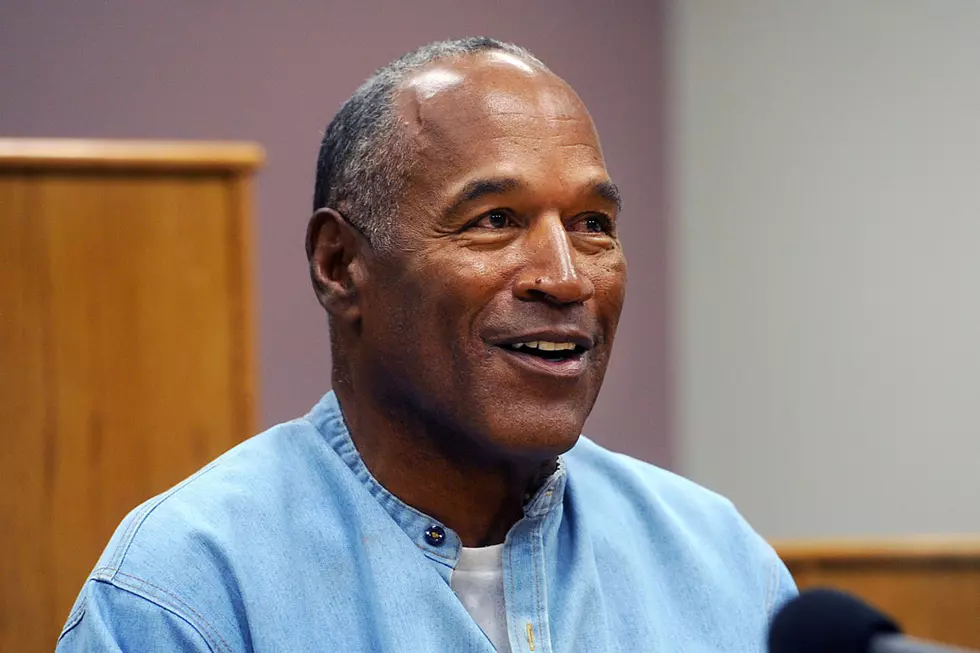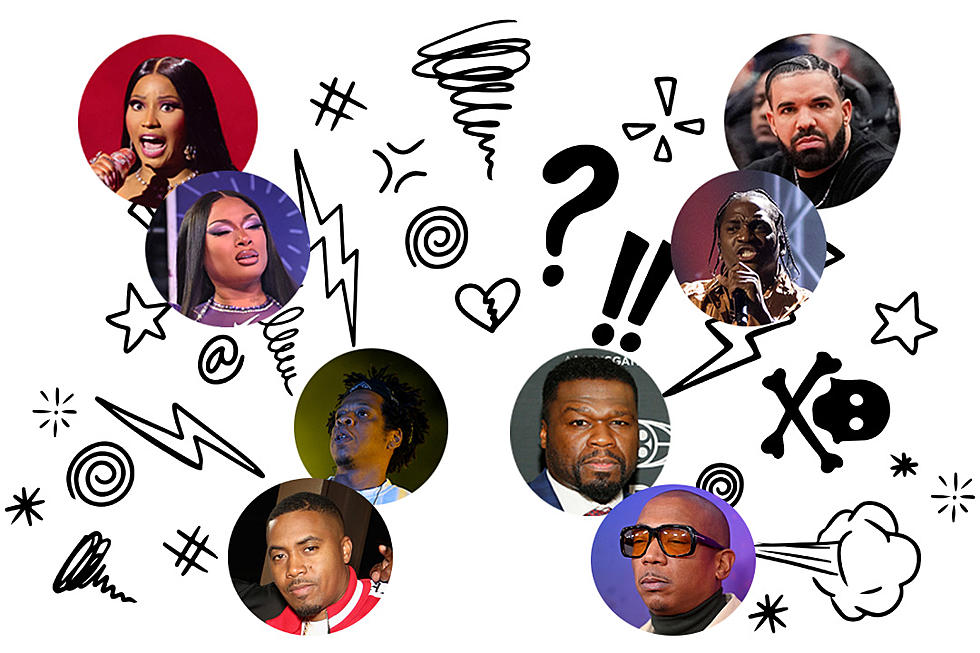Jay-Z: I’ll Still Kill (Part I)
Just when you thought it was safe, just when you thought the world’s greatest MC had left the streets behind to put his feet up on a beach chair, just when you least expected it: Jay-Z’s back. Again. With a vengeance.
There’s a party going on at New York’s Roc the Mic studios. The music is deafening, the Patrón shots are flowing, Beyoncé is shaking her rump, and everyone has stopped watching Denzel Washington on the monitors above the booth. This is where Jay-Z has been for the last two weeks, creating an album in a whirlwind of inspiration after catching an early screening of the movie American Gangster.
In the flick, Denzel plays Frank Lucas, a superduper heroin kingpin who accumulated $250 million in the 1970s. The character’s calm, cool persona reminded Jay of himself and relit a spark inside him to record music about his own checkered past. Who’s to say he said it all in Reasonable Doubt? “I lived a rich life,” he says, fiddling with his black laptop to cue up the next song. “I knew there were stories there, I just didn’t think that I would be able to get there in an honest way and really relive those emotions.”
It seems like strange timing. An album of unapologetic criminology rap at a time when—in the wake of the Imus scandal—even folks like Russell Simmons are endorsing censorship. Then again, a year after Jay’s last album, Kingdom Come, was widely panned as “adult contemporary” hip-hop, his street credibility could sure use a boost. Former hustler buddies Calvin Klein and DeHaven have gone public with accusations that Jay is out of touch and dishonorable, while disgruntled Def Jam artists like LL Cool J complain about getting the back-burner treatment as their label’s president puts out his own music.
Speaking of the corporate side, Jay’s contract is up at the first of the year, and rumors have him bouncing to join his old Roc-A-Fella protégé Kyambo “Hip-Hop” Joshua and Def Jam co-founder Rick Rubin in rebuilding the venerable Sony/Columbia (though the pair just signed one of Jay’s most vocal antagonists, Dipset’s Jim Jones). Looks like it’s gonna be a hot winter. But in the meantime, Jay-Z’s 10th album is on par with some of his finest work. And, for now, he’s lost in the music.
It’s not every day in hip-hop you hear a legendary rapper say he saw a movie that inspired him to create an album.
Yeah. When I saw the movie, the way Denzel portrayed the character, you know, we never seen a Black guy ascend this high in a movie before, to being over the mob. So immediately that struck with me. Like, the success of it all. Like, “Wow, go!” [Applauds] The reason we applaud Oprah—no matter what she says about us—it’s ’cause she’s gone so far. One of the most important scenes [in the movie] to me was when Denzel and the T.I. character sat down, and they had that talk. T.I. was a pitching prospect. Denzel’s character got him that tryout with the Yankees, and he blew it off, and Denzel was like, “Why did you blow it off?” And he’s like, “I want to be like you.” They didn’t show the scene after that. Denzel in the corner reflecting. Denzel in his bedroom crying. You know, like in The Godfather. The Godfather didn’t want Michael in the business, right? I’m sure Denzel felt the same way about his nephew. But he couldn’t say that. So what I did was take emotions from [scenes like] that. Like, I took that emotion and pulled it into my song [“Sweet”]. So it’s my own movie. I call it an indie film now—that’s my new shit. It’s the indie-film version of American Gangster.
It also gave you a chance to do an album with content more in the vein of Reasonable Doubt, right? More street content.
Exactly. I never thought I would make it back there. I never thought I would be in that place. Because I wasn’t going to do it for the sake of doing it. That’s corny, and that’s fake. If I don’t show the world growth, how are we going to grow? And I represent hip-hop as well, you know, with what I do. What I do is a reflection on hip-hop. And if I don’t show growth, then they going to be like: “This guy right here, he’s successful. Why is he shooting at people in his raps?”
It’s interesting that, in a year where we had the Imus scandal and all these attacks on hip-hop, you would make a record like this, at this level in your career. Do you worry about being misunderstood?
I don’t really care about that, ’cause it’s true emotions. You can’t just fix a curse and fix a neighborhood. If you told me tomorrow that if I stop saying “nigga,” that the neighborhood would be fixed, I’ll never say “nigga” again. I’ll never say shit again. I deal with that on this album, with the “Ignorant Shit.” Scarface the movie did more than Scarface the rapper, to me, but still that ain’t the blame for everything that has happened to me. If you’re going to attack a section of entertainment, you have to attack it all. You can’t just attack music. You have to attack films and video games—they killed more people in the opening of Grand Theft Auto than 50 Cent killed on any one of his albums. All his albums put together.
How did you feel when all that went down? Did you think it was just something that was going to blow over?
Yeah. I didn’t even think it was worth my attention. Because I was really upset that—like, how did we get there? We just took the argument and moved it. Imus is a racist. Hip-hop are entertainers. They’re entertainers. That’s two different issues. Imus is not a fan of hip-hop. He couldn’t name three songs off of any rapper’s album. He’s not a fan of hip-hop. He’s not listening to hip-hop. So he’s not influenced by hip-hop. That’s his choice and his feelings. Or even his playing and going way too far. Which is cool. If he stood behind that, like: “I’m just entertaining. I’m acting a fool.” That’s cool. That’s not what he said.
The hip-hop community was mad ’cause Russell said we should clean it up and—
I had a conversation with Russell, to be perfectly frank. I’m like: “Russell, man, you gotta be careful in how you go about doing that. You represent us. You can’t do that. At least have a conversation with everybody about it. You just can’t speak out like that.” And I don’t agree. You know, I ain’t agree with everybody going on Oprah. I thought it was really a bad move for us, because there’s no way to win. That show, it’s not edited by us. You can’t win. It’s not an equal forum. I don’t think that was the right forum for that type of conversation. If you have the conversation, really have the conversation. Have a conversation. Don’t talk at me.
This new music is coming after Kingdom Come, an album where you showed maturity and growth and laid off of the street content. Do you feel like the rap audience misunderstood where you were going with Kingdom Come?
Art is subjective. It’s subjective, right? So, you know, you gotta be careful with—you don’t have to be careful. You’re really supposed to do what you gotta do, and if people follow you… But the space I was in, it’s very difficult [for the audience] to relate to those emotions. Like, you can relate to the emotions on Blueprint. You know, that’s more—universal feeling. That’s the struggle. It’s hard to relate to the feeling on the other side. And I think it was too much of that, but it was an honest feeling at the time. Like I said, I love that because that’s what I’m supposed to be doing—whether it’s accepted by everybody or not. I’m supposed to be pushing the envelope and trying new things. And people are supposed to say, “Hov, you might have went too far.”
It’s the new generation of fans and rappers who are gonna judge you the harshest. Do you think it’s fair that you’re compared to every new sensation, like Lil Wayne?
I don’t think it’s fair to me, and I don’t think it’s fair to them, with the amount of work that I put in. But it’s human nature. So I gotta do what I’ve been doing. I gotta compete with my work. Not to take anything away from him. I think Lil Wayne is extremely talented. I think he’s one of the most talented ones out there. I mean, even more so how his delivery is than what he says. I don’t think some of the things he says sometimes are the greatest things, but the way he delivers it, that’s part of it. People got to look at that, too. That’s a big, important part of the puzzle. But do I think me and Lil Wayne should be in the same sentence? Me? No. I mean, hopefully one day. He has to accumulate work. Put some classics under his belt.
So you’re not ready to hand him or anyone else the torch yet. This isn’t gonna be your last album?
I want to never say that again. Just make the albums, man. And if one day people wake up and it’s four years later, and you haven’t made another, they go, “Wait a minute, you’re retired!” I think that’s best for me. I think I pulled the retirement ripcord too many times. People looking at me like, “Please shut up.” I was looking at Fade to Black the other day. I was embarrassed. I couldn’t watch. I’m not playing with you. I had to turn it off. I was cringing. Like, I’m about to put out another album, man. Another one. Not only was that not my last, I put out another one, and I’m about to put out another one. I wasted a great film! I’m about to make another film, though. Not on retirement, just another film. I want to make a movie with this album. Like a short film, a better Streets Is Watching. I want to get the Hughes brothers to direct it. I’ll be doing a disservice if I didn’t deliver it [American Gangster] in a proper way.
 THIS IS ONLY HALF OF THE XXL'S COVER STORY INTERVIEW WITH JAY-Z FROM OUR DECEMBER ISSUE. CHECK BACK ON MONDAY (OCT 22) TO READ THE CONCLUSION IN PART 2!
THIS IS ONLY HALF OF THE XXL'S COVER STORY INTERVIEW WITH JAY-Z FROM OUR DECEMBER ISSUE. CHECK BACK ON MONDAY (OCT 22) TO READ THE CONCLUSION IN PART 2!
More From XXL









